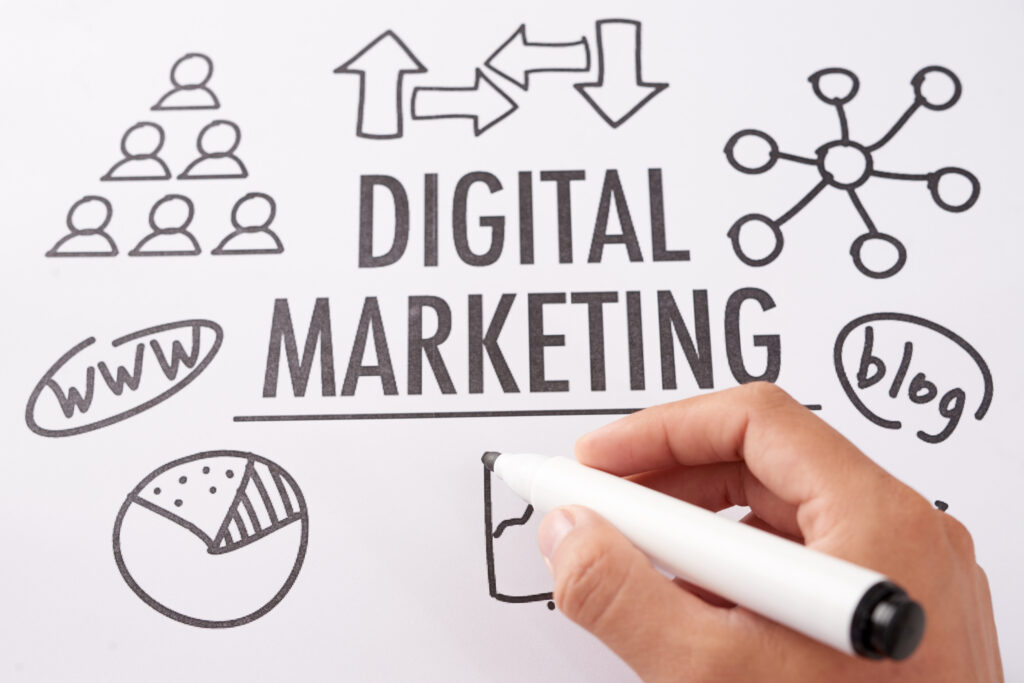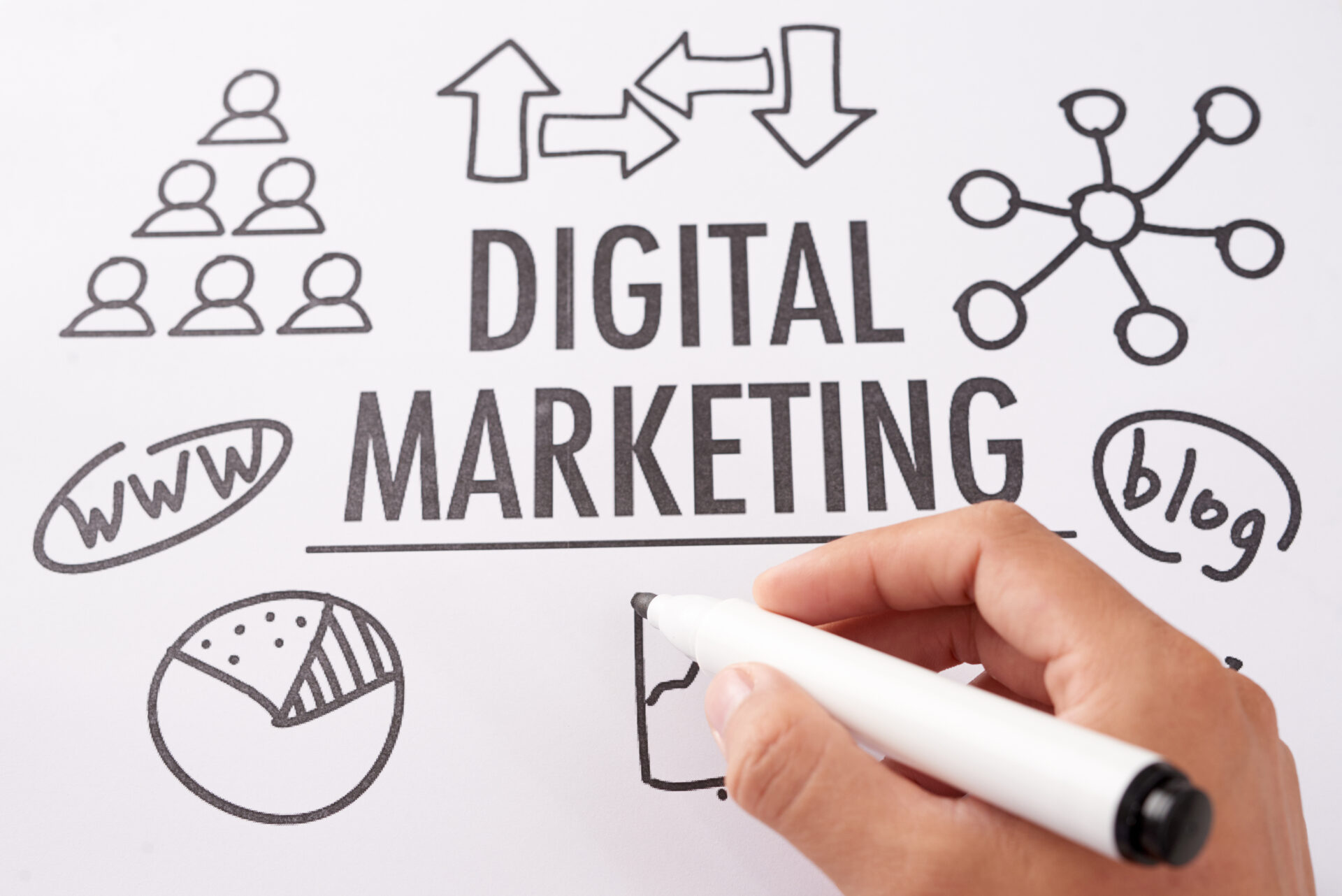Ever wondered how some brands leverage Google, social media, and analytics so effectively? Digital marketing has transformed the business landscape, offering companies unparalleled reach and real-time engagement. Today no company or person functions without digital, and upskilling and understanding how to implement digital marketing effectively is a key strength and relevant skill.
Read this article to gain insights into what a digital marketing strategy course typically includes, the different learning formats available, and how they cater to both beginners and experienced professionals. Learn how EDHEC’s Online Master of Science in Strategic Marketing can offer you a strategic edge in today’s competitive landscape.

What Is a Digital Marketing Strategy Course?
A digital marketing strategy course is designed to provide learners with a structured framework for planning, executing, monitoring, and optimising marketing campaigns across digital channels. The objective of such a course is to develop both strategic thinking and practical skills that enable professionals to thrive in the ever-evolving digital landscape.
What Does a Digital Marketing Course Include?
Digital marketing programs usually include several key elements that build a well-rounded understanding of digital strategy:
Search Engine Marketing
- Running campaigns through platforms like Google Ads
- Applying structured tools from Google Digital Garage
- Developing advertising skills through practical training in search platforms and understanding keyword bidding, targeting, and optimisation
Social Media Advertising
- Managing ads via Meta Ads Manager and LinkedIn Campaign Manager
- Creating and monitoring campaigns across major platforms
- Building expertise in audience targeting, content creation, and performance tracking across diverse social networks
Data Analysis Techniques
- Interpreting consumer behaviour using marketing analytics
- Measuring and optimising campaign ROI
- Applying data-driven strategies to improve outcomes and support evidence-based decision-making
Email Marketing and CRM Systems
- Designing personalised lifecycle campaigns
- Automating customer segmentation using tools like Mailchimp, HubSpot, and Salesforce Marketing Cloud
- Strengthening customer engagement through tailored communication and performance measurement
Website Strategy
- Enhancing user journeys through UX principles
- Tracking site performance using web analytics
- Improving online experiences with optimised navigation, responsive design, and behavioural insights
Search Engine Optimisation (SEO)
- Boosting visibility with keyword research and on-page enhancements
- Monitoring performance using tools like Semrush, Ahrefs, Semji, and Google Search Console
- Increasing organic reach by refining site structure, backlink strategies, and technical SEO components
Artificial Intelligence (AI)
- Automating workflows with predictive analytics and personalisation
- Integrating AI-generated content and data models into campaign planning
- Enhancing efficiency and relevance across digital channels through intelligent automation
Whether it’s a short course, certificate, or part of a broader academic program, the aim is to equip marketers with a blend of theoretical foundations and hands-on experience tailored to today’s digital marketing landscape. These components represent the core of most programs, though other complementary modules may also be included, such as mobile marketing, influencer partnerships, or video strategy, depending on the course structure.
Why Pursue Digital Marketing Strategy Training?
As the business world becomes increasingly digital, organisations are in urgent need of professionals who can navigate both traditional marketing principles and digital-first tactics. A strong understanding of digital marketing strategy enables professionals to connect with audiences in real-time, adapt to emerging tools, and measure performance with precision.
Enrolling in a formal course can help you gain:
- Actionable knowledge from industry experts with real-world experience
- A structured foundation in the fundamentals of digital marketing across key channels
- Essential skills in campaign planning, channel strategy, and ROI measurement
- Strategic insight to align marketing efforts with business objectives
- Confidence to manage digital transformation initiatives and lead teams
- Greater professional credibility and legitimacy in a competitive job market
These capabilities are invaluable whether you’re launching a freelance business, leading marketing efforts within a company, or upskilling for a new role in a digital-first economy.
Fundamentals of Digital Marketing: What to Expect
Before exploring how to learn digital marketing strategy, it’s important to understand the core elements that form its foundation. These fundamental areas are the building blocks of every effective digital marketing plan:
- Search Engine Marketing and SEO: Use platforms like Google Ads and tools such as Semrush to increase visibility and drive traffic.
- Content Marketing and Social Media: Develop storytelling strategies, boost engagement, and manage brand presence across digital channels.
- Email Marketing and CRM: Build personalised communication strategies and nurture leads using automation and customer data.
- Analytics and Measurement: Track key performance indicators, conversions, and ROI to assess and refine campaign effectiveness.
- Paid Advertising: Manage targeted campaigns across networks like Google and Meta to reach specific audiences efficiently.
- Customer Journey Mapping: Analyse user interactions and design pathways that align with business goals and user intent.
- Strategic Planning and Optimisation: Define objectives, allocate resources, and refine approaches for continuous improvement.
These pillars form the basis of most digital marketing courses and programs.
What Are the 7 Cs of Digital Marketing?
Building on the foundational elements of digital marketing, the 7 Cs model offers a strategic lens for refining campaigns and messaging. These components serve as guiding principles for marketers aiming to develop coherent, customer-centric strategies:
- Customer: The foundation of all marketing efforts, with strategies tailored to meet customer needs and behaviours.
- Content: The engine of engagement, offering valuable and relevant storytelling that attracts and retains audiences.
- Context: The environment in which content is delivered, ensuring it reaches the right people at the right time and place.
- Community: The network of loyal followers and advocates that enhances brand visibility and trust.
- Convenience: The ease of accessing products or services, improving user satisfaction and experience.
- Cohesion: The alignment of messaging and visuals across all channels to maintain brand consistency.
- Conversion: The transformation of audience interest into measurable business outcomes like sales, leads, or registrations.
Understanding this 7‑point model can streamline campaign planning and unify brand messaging.
Turning the 7 Cs into Actionable Digital Marketing Strategies
After understanding the 7 Cs, it’s important to explore how they translate into actionable marketing approaches. The following strategies are widely used in the industry and reflect key areas where marketers can drive value:
- Improve organic visibility with SEO (Search Engine Optimisation): Enhance your website content, structure, and authority to rank higher in search engine results
- Drive traffic through SEM (Search Engine Marketing): Use paid ads on platforms like Google Ads to reach target audiences quickly
- Engage audiences using Content Marketing: Develop and share relevant content that attracts and retains customer interest
- Build brand presence through Social Media Marketing: Utilise platforms such as LinkedIn, Instagram, and TikTok to foster engagement and community
- Nurture leads via Email Marketing: Implement personalised campaigns that guide potential customers through the sales funnel
- Expand reach with Affiliate and Influencer Marketing: Collaborate with third parties and industry voices to gain exposure and trust
- Optimise outcomes with Analytics-Driven Strategy: Leverage data tools to measure, evaluate, and continuously refine your digital activities
Courses that include these tools tend to be most effective for up-and-coming digital marketers.

How Can I Learn Digital Marketing Strategy?
Professionals gain knowledge of digital marketing strategy through different training formats based on their needs and objectives. Here are some effective options:
Certified Online Platforms
These offer tailored digital marketing online experiences through cohort-based or self-paced programs. They typically provide structured lessons, peer interaction, and certificates upon completion. Ideal for learners who want flexible, recognised credentials without enrolling in a full degree.
Free Training Resources
These are free learning options offered by platforms like Google’s Digital Garage. They provide foundational knowledge in areas such as SEO, analytics, and online advertising, ideal for beginners or professionals seeking a refresher.
Specialised Short Courses
These focused digital marketing strategy short courses or internet marketing classes target professionals looking to quickly build specific skills, such as SEO, email marketing, or social media strategy. Ideal for those who want to upgrade their skills in a short time or specialise in a niche area.
Higher Education Programs
These include advanced academic degrees, such as EDHEC’s Online Master of Science in Strategic Marketing, providing a comprehensive understanding of digital strategy, leadership, and analytics within a rigorous academic setting. Ideal for professionals aiming for senior roles, academic credentials, or deep strategic insight.
Each route provides a distinct learning experience, allowing professionals to choose what best aligns with their career path and goals.
How To Choose the Best Course for Digital Marketing
Selecting the best course in digital marketing depends on several criteria that influence both learning outcomes and career impact.
What Is the Best Course for Digital Marketing?
When selecting the best digital marketing course, consider the following key criteria to ensure it aligns with your professional goals.
- Recognition: Industry-recognised certification or affiliation with a respected academic institution adds credibility and enhances your professional profile.
- Curriculum: Comprehensive content should include tools like Google Ads, content strategy, data analytics, social media, email marketing, and CRM systems.
- Format and Delivery: Course structure should integrate hands-on projects, case studies, and input from industry experts to ensure practical application.
- Community and Network: Access to a peer or alumni network provides collaboration opportunities and expands your professional connections.
- Cost: Tuition should be weighed against course content, recognition, and career impact, with options ranging from free platforms to advanced academic programs.
For those seeking credentials and deeper strategic insight, a program like EDHEC’s MSc Strategic Marketing offers academic prestige combined with practical relevance and access to EDHEC’s extensive alumni network of 60,000 professionals worldwide.
The Value of a Digital Marketing Strategy Course
After exploring the key principles, learning pathways, and strategic frameworks of digital marketing, it’s clear that a well-designed course offers much more than just theoretical knowledge. It equips professionals with the tools, confidence, and credibility needed to succeed in a competitive digital-first environment.
Here’s why it’s a worthwhile investment:
- Gain sought-after skills across the digital marketing landscape
- Earn recognised credentials that boost employability
- Build valuable connections with industry experts and peers
- Apply knowledge directly to real-world campaigns and strategic projects
Whether you start with a free introduction or commit to a full academic program, a structured digital marketing course delivers measurable value and long-term career impact.
Advance in Digital Marketing with EDHEC’s MSc
To build digital marketing strategy expertise, strengthen your professional profile, and qualify for advanced roles, consider EDHEC’s Online Master of Science in Strategic Marketing. This advanced program combines theory with practical learning for real-world application. Through innovative courses, a case-based approach, expert faculty, and personalised coaching, you’ll gain the tools to become a digital marketing strategist capable of delivering data-driven, impactful campaigns.



